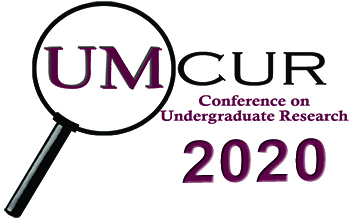Project Type
Poster
Faculty Mentor’s Full Name
Jenna Griffin, M.S., CCC-SLP
Faculty Mentor’s Department
The School of Speech, Language, Hearing, and Occupational Sciences
Abstract / Artist's Statement
Aphasia is a language impairment that commonly disrupts language comprehension (i.e., reading and listening to spoken language) and production (i.e., speaking and writing) in stroke survivors. Persons with aphasia (PWAs) are often cared for by an unpaid family caregiver (i.e., spouse, relative, friend) who assists them with activities of daily living and daily communication tasks (e.g., texting, emailing, phone calling). During a 4-week intensive comprehensive aphasia program (ICAP) at the University of Montana (UM) family caregivers of PWAs participated in interventions designed to improve family caregiver well-being, to improve PWA-caregiver communication, and to improve quality of life for both PWAs and family caregivers. During UM ICAP programs between 2016-2018, family caregiver psychosocial outcomes were assessed using the Perceived Stress Scale (PSS) and the Bakas Caregiving Outcomes Scale (BCO). These assessments are used to measure psychosocial characteristics including stress, psychosocial changes accompanied by caregiving, and the social and emotional impacts of being a caregiver. These assessments were administered before the caregivers began the ICAP and then again after the ICAP program was completed (n=20). During the ICAP, caregivers participated in psychoeducation sessions, group counseling sessions, and specialized communication skill and strategy use training. These interventions were delivered by a licensed family counselor and speech-language pathologists from the University of Montana. These weekly interventions consisted of two one and a half hour sessions of group counseling and one, one and a half hour session of group aphasia education and communication training. Scores from the three pre-post outcome measures will be analyzed to investigate the psychosocial effects of the ICAP family caregiver interventions on psychosocial well-being. Findings have the potential to illustrate the importance of improving caregiver services for stroke survivors with aphasia.
Category
Social Sciences
Poster Presentation with Audio
An Exploration of Group Intervention for Family Caregivers of Stroke Survivors with Aphasia
Aphasia is a language impairment that commonly disrupts language comprehension (i.e., reading and listening to spoken language) and production (i.e., speaking and writing) in stroke survivors. Persons with aphasia (PWAs) are often cared for by an unpaid family caregiver (i.e., spouse, relative, friend) who assists them with activities of daily living and daily communication tasks (e.g., texting, emailing, phone calling). During a 4-week intensive comprehensive aphasia program (ICAP) at the University of Montana (UM) family caregivers of PWAs participated in interventions designed to improve family caregiver well-being, to improve PWA-caregiver communication, and to improve quality of life for both PWAs and family caregivers. During UM ICAP programs between 2016-2018, family caregiver psychosocial outcomes were assessed using the Perceived Stress Scale (PSS) and the Bakas Caregiving Outcomes Scale (BCO). These assessments are used to measure psychosocial characteristics including stress, psychosocial changes accompanied by caregiving, and the social and emotional impacts of being a caregiver. These assessments were administered before the caregivers began the ICAP and then again after the ICAP program was completed (n=20). During the ICAP, caregivers participated in psychoeducation sessions, group counseling sessions, and specialized communication skill and strategy use training. These interventions were delivered by a licensed family counselor and speech-language pathologists from the University of Montana. These weekly interventions consisted of two one and a half hour sessions of group counseling and one, one and a half hour session of group aphasia education and communication training. Scores from the three pre-post outcome measures will be analyzed to investigate the psychosocial effects of the ICAP family caregiver interventions on psychosocial well-being. Findings have the potential to illustrate the importance of improving caregiver services for stroke survivors with aphasia.
